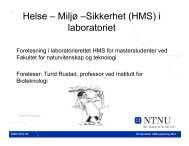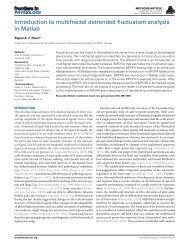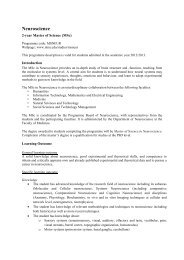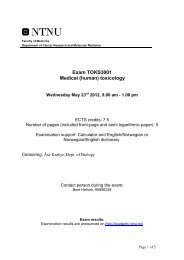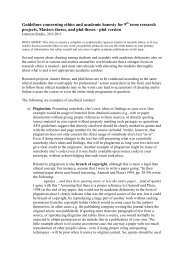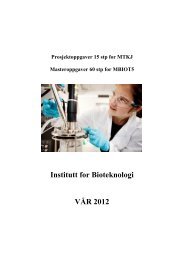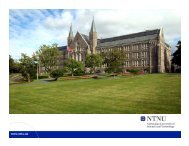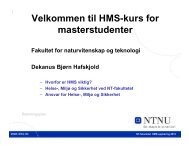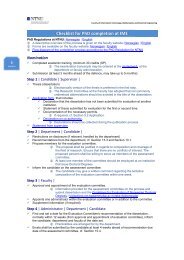Annual Report 2011 - NTNU
Annual Report 2011 - NTNU
Annual Report 2011 - NTNU
Create successful ePaper yourself
Turn your PDF publications into a flip-book with our unique Google optimized e-Paper software.
NOVEMBER— DECEMBER <strong>2011</strong><br />
PAGE 3<br />
Latest<br />
Globalization<br />
Publications<br />
Aarseth, Wenche, Rolstadås, Asbjørn<br />
and Andersen Bjørn<br />
(<strong>2011</strong>) Key factors for<br />
Management of Global<br />
Projects. International Journal<br />
of Transitions and Innovation<br />
Systems, 1(4): 00-00.<br />
Attanapola, C.T.; Brun, C. and<br />
Lund, R. (<strong>2011</strong>). Working<br />
gender after crisis: partnerships<br />
and disconnections<br />
in Sri Lanka after the Indian<br />
Ocean tsunami. Gender,<br />
Place & Culture,<br />
DOI:10.1080/0966369X.2<br />
011.625080<br />
Berit Berg og Torunn A. Ask<br />
(eds.) (<strong>2011</strong>): Minoritetsperspektiver<br />
i sosialt arbeid. Oslo:<br />
Universitetsforlaget.<br />
Upcoming events<br />
5—7 January 2012. Workshop<br />
“Objectification, measurement<br />
and standardization” at<br />
Dokkhuset, Trondheim<br />
The workshop marks the beginning<br />
of a planned interdisciplinary<br />
and international project<br />
called “Objectification, Measurement<br />
and Standardization as Social Processes”.<br />
The project is in part a continuation<br />
of the activities of the<br />
“standardization group” at<br />
<strong>NTNU</strong> which organized the conference<br />
“Globalization, Identity and<br />
Standardization” in 2005. The new<br />
project is intended to break new<br />
ground, but it is also continuous<br />
with work that began more than a<br />
decade ago, spawning doctoral<br />
and master’s theses as well as<br />
scholarly papers.<br />
The ambition of the new project<br />
is three-pronged. First, we wish<br />
to examine some of the contemporary<br />
trends which to a large<br />
extent define our present era.<br />
For more information, please<br />
contact: tord.larsen@svt.ntnu.no<br />
Military power and ethics in the grey area of Afghan war: A critical ethicalphilosophical<br />
analysis of the core values of the Norwegian Armed Forces:<br />
Respect, responsibility and courage<br />
Cornelia Vikan<br />
Department of Philosophy<br />
The point of departure of this project is<br />
Norway`s military efforts in the war in<br />
Afghanistan, which is understood as a<br />
complex conflict. The focus is on ethical<br />
dilemmas arising in this context. One<br />
important aspect of the Afghanistan case<br />
is that scenarios on the ground, which the<br />
soldiers face, shift continuously between<br />
regular warfare and an after war scenario.<br />
This situation gives rise to ethically grey<br />
areas for the application of the rules of<br />
war, and creates new challenges for military<br />
agents, partly related to their traditional<br />
role in war. The empirical basis for<br />
this project is the core values of the Norwegian<br />
Armed Forces (respect, responsibility<br />
and courage) and cases from military<br />
The present time is characterized as the<br />
''urban millennia''. The migration trends<br />
often described through concepts of urbanization<br />
and centralization have led to<br />
over half of the world's population now<br />
living in cities. It is estimated that over<br />
60% of the population will live in cities by<br />
2030. The movement of human capital<br />
and firms is often described as traits of the<br />
globalization process and leads to increased<br />
interconnectedness throughout<br />
the world. Globalization is a phenomenon<br />
affecting nations, but the same processes<br />
have effects also at the local level. This<br />
aspect of population movement motivates<br />
studies of regional differences.<br />
The main focus of this project is to investigate<br />
household and firm location decisions<br />
and the effect of the spatial distribution<br />
by using econometric methods. Clustering<br />
of households and firms can be<br />
understood with relating to the production<br />
and consumption aspects of the<br />
economy. From a production viewpoint,<br />
clustering of households and firms is often<br />
seen as favourable process by economists<br />
because of agglomeration economy.<br />
Agglomeration economy is the increasing<br />
return from scale that stem from clustering.<br />
The reason for arising agglomeration<br />
effects can be spatial differences in the<br />
New PhD Projects<br />
operations in Afghanistan. The project<br />
proceeds from a descriptive to a normative<br />
perspective and asks following questions:<br />
What do ethical dilemmas in complex<br />
conflicts look like from a military perspective?<br />
How should such dilemmas be approached?<br />
This PhD project is connected to the<br />
Globalization Focus Area Intercultural<br />
Dynamics: Communication, Responsibility<br />
and Development. Professor May<br />
Thorseth from the Department of Philosophy<br />
and Henrik Syse from PRIO supervise<br />
the project.<br />
Empirical analyses of centralization trends, local amenities and regional<br />
income differences in Norway<br />
Stefan Leknes<br />
Department of Economics<br />
level of human capital and/or nonhuman<br />
endowments. Another possibility<br />
is arising interaction effects like better<br />
input-output linkages between intermediate<br />
and final-goods suppliers, matching of<br />
worker and firms in thick labour markets,<br />
and technological externalities. One goal<br />
of this project is to identify and quantify<br />
these effects on wages.<br />
Historically, cities have been regarded as<br />
production centres. Today cities can be<br />
seen as loci for consumption. The trend is<br />
that industry moves out of the cities and<br />
service businesses flourish in its place.<br />
This gave a spark to a literature concerning<br />
quality of life that the researcher<br />
draws on.<br />
Methodologically the project utilizes panel<br />
data from Statistics Norway both on<br />
regional and household level. The key<br />
variables to establish a causal relation are<br />
wage, productivity, housing prices, local<br />
amenities and quality of life measures.<br />
This PhD project is connected to the<br />
Globalization Focus Area Global Economic<br />
Flows, Governance and Stability.<br />
Professors Hildegunn Ekroll Stokke<br />
and Bjarne Strøm from the Department<br />
of Economics supervise the project.



